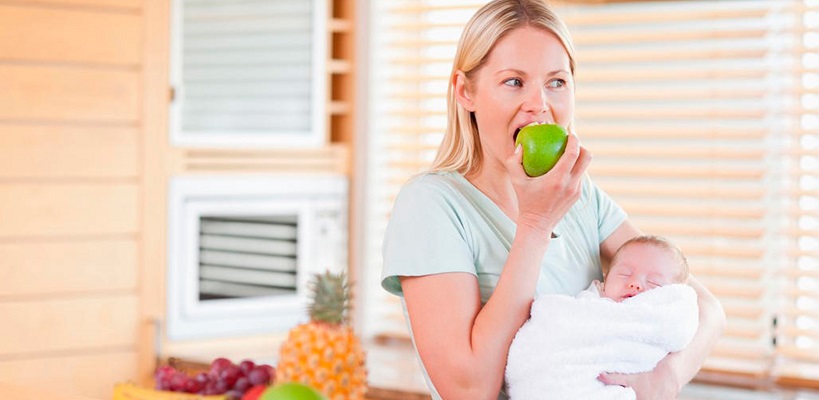Breastfeeding Diet 101: How to Get All the Nutrients You Need
Contents
When you are breastfeeding, it’s important to eat plenty and stay hydrated to keep a good milk supply and maintain your health and energy levels. Some people say that you must “eat for two” when you’re pregnant, this is totally not true. The caloric requirement for a pregnant woman doesn’t actually increase in her first trimester; it only increases in her second and third trimesters by approximately 300-400 calories per day. It’s when your baby is born and exclusively breastfeeding that your energy requirements increase most.
While breastfeeding, you’ll need an additional 2000 KJ (energy) per day. This extra energy should be obtained from nutrient-rich foods and not junk foods, as your baby relies on you for vitamins and minerals. Sometimes a couple of extra snacks or small meals a day are usually sufficient to compensate for any additional energy needs while breastfeeding. For example, adding a smoothie made with full-fat milk and yogurt, banana, a handful of raw nuts and a couple of pieces of fruit or a couple of lactation cookies to a normal healthy diet should be enough to cater for these requirements.

You’re probably wondering what are breastfeeding cookies? Also known as lactation cookies, these goodies are packed with essential vitamins and minerals that help nourish new mums. They are made with certain ingredients known as galactagogues that are associated with increasing milk supply. These cookies are just like the ones grandmas used to bake and bring over to help support new mums with a nourishing and easy-to-eat snack. These days, there is a range of ready-made breastfeeding cookies as well as cookie mixes available to make life easier for new mums.
While there is little scientific research available on breast milk supply and diet in women, and no one really knows how these ingredients influence breast milk, there is a lot of anecdotal evidence supporting the effects of lactation cookies. A great percentage of mothers who eat these cookies report an increase in milk supply, and this may be a placebo effect. Some of my friends who are breastfeeding, like to eat lactation cookies for their own peace of mind and enjoy having a healthy snack on hand that helps nourish their body while they’re breastfeeding. I always bring a pack of these cookies with me when visiting a new mother. Because I’m a baking enthusiast with a great mixer in my kitchen, sometimes I bake homemade lactation cookies for them.
What Foods Should You Eat While Breast-Feeding?

Your breastfeeding diet should be focused on healthy choices to help fuel your milk production. Opt for protein-rich foods like eggs, lean meat, beans, dairy, lentils and seafood low in mercury. Also, make sure to include a variety of whole grains, fruits and vegetables. Eating different foods while breastfeeding will change the flavour of your milk, which will expose your baby to different tastes. This might help your little one accept solid foods more easily down the road.
How Much Fluid Do You Need While Breastfeeding?
You should drink plenty of fluids when breastfeeding and drink even more if your urine appears dark yellow. Experts recommend drinking a glass of water or another healthy beverage every time you breastfeed. Stay away from juices and sugary drinks as too much sugar can contribute to weight gain. Too much caffeine can also be troublesome. Limit yourself to no more than 2-3 cups of caffeinated drinks a day as too much of it in your breastmilk might agitate your baby or interfere with his/her sleep.
What Foods and Drinks Should You Avoid or Limit While Breastfeeding?

There are certain foods and drinks that deserve special attention while breastfeeding. For example, there’s no level of alcohol in breast milk that’s considered safe for a baby. So, if you drink, avoid breast-feeding until the alcohol has completely cleared your breast milk, which usually is two to three hours for 350 millilitres. Consider pumping milk before you drink alcohol to feed your baby later.
Seafood is another example. While seafood is a great source of protein and omega-3 fatty acids, some types can contain high levels of mercury or other contaminants. Exposure to excessive amounts of mercury through breast milk can pose a risk to a baby’s developing nervous system. Seafood that should be avoided due to high mercury content includes swordfish, tilefish and king mackerel.
When to Consider Supplements?
If you’re a vegetarian, your health care provider will likely recommend a daily vitamin B-12 supplement. This is because this type of vitamin is found almost exclusively in animal products, making it difficult to get enough of it in vegetarian diets. Also, if you don’t eat fish, you should consider talking with your health care provider about taking an omega-3 supplement. If you don’t eat enough vitamin D-fortified foods, such as cow’s milk and some cereals, and have limited sun exposure, you might need vitamin D supplements. Babies need vitamin D to absorb phosphorus and calcium. Not enough vitamin D may weaken your bones.



